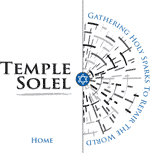Several weeks ago, I blogged about the dangers of the Internet, in the context of how dangerously easy the online world makes it to engage in gossip.
This week's Torah portion gives us the chance to explore the dangers of the Internet from a different perspective: that of our privacy (or lack, thereof).
A central question that our society has to wrestle with right now is whether or not there should be any notion of privacy online. The success of facebook (which is built on the premise that the more we share about ourselves to others, the better) challenges long held beliefs about what we share with others. (Everyone would do well to read the Time Magazine Person of the Year profile of facebook founder Mark Zuckerberg to see his views about privacy.)
There are social ramifications to what we share about ourselves online: if we post something via a social networking app about something we did that was clearly at odds with a policy of our employer's, we could lose our job. With specific regards to facebook, one of the ways that you can minimally protect yourself against this sort of thing is to be more actively involved in manging your facebook privacy settings. Better yet: be extra judicious about what you put online in the first place!
And there are also economic ramifications. Right now, many online advertisers have the ability to sneakily read the cookies in our computers. In doing so, they learn about our recent Internet activity, and can then customize advertising that fits a profile based on our background and interests.
Thankfully, Congress is finally moving with legislation that will begin to offer Internet users a minimal amount of protection from corporate America's invasion of our online policy. To get up to speed on some of the proposals that Congress is considering, click here or here.
How coincidental that this week's Torah portion (Parshat Tetzaveh) offers us one of the foundational prooftexts for the longstanding Jewish assertion of a fundamental right to privacy. Tucked into the details of the Torah's description of the unique garments that Aaron was supposed to wear when he was serving as High Priest in the Tent of Meeting, we read that:
"On its [Aaron’s High Priest robe] hem, make pomegranates of blue, purple, and crimson yarns, all around the hem, with bells of gold between them all around […] so that the sound of it is heard when he goes in to the sanctuary before the Lord and when he goes out – that he may not die (Exodus 28:33-35)."
How curious that the Torah would go out of its way to insist that the garment should have bells on! It was the Biblical Author's way of suggesting that no one - even the High Priest - has the right to enter a space without knocking...without getting the permission and consent of the person(s) who might be inside.
Internet privacy is of course not exactly the same thing as being concerned about someone walking unannounced into your home. But our tradition absolutely sees it as conceptually similar. Because when someone consumes data about us online without our permission, our privacy has been violated - in a way that carries all of the same consequences as someone who comes in unannounced.
Relatively little has been written about these issues from a specifically Jewish context. One text that is worth reading is the decade-old responsum from the Conservative movement on the subject. At one point in the document, it asserts that "In sum, individuals, under Jewish law, have a right to decide who will have access to their correspondence and private information."
In a day and age in which our identities can be compromised so easily, and at a time when companies can easily scan our online history without our permission - the problem does not just fall to Congress. We cannot sit around and wait/hope that the Legislative Branch will somehow miraculously protect our best interests. The responsibility falls to us. This week's Torah portion teaches us clearly: we have a right to privacy. What steps are we willing to take to protect it?
Will we be more vigilant about the browsers that we use and the sites that we visit? Will we be more thoughtful about who we share our facebook profiles with?
Or is privacy an outdated notion? In this day and age of Wikileaks, maybe transparency and full disclosure are more valuable?
What do you think? I'd love to hear your comments.
Shabbat Shalom,
Rabbi Brown





No comments:
Post a Comment